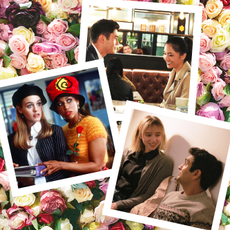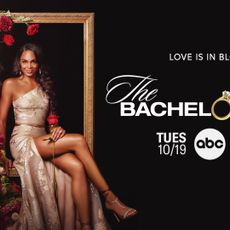What if Your Best Friends Are Your Worst Enemies?
In our February issue, Lori Gottlieb — author of Marry Him: The Case for Settling for Mr. Good Enough — provoked hundreds of furious e-mails from you by suggesting that women are too picky. Now she argues that female friendships are a sham. Get ready to hit the Send Button!

Remember the scene at the end of the first Sex and the City movie, when the fabulous foursome was sitting down to cocktails? Samantha had just left Smith, her gorgeous, adoring boyfriend — whom she loved and who had lovingly supported her through breast cancer — because "I love myself more." That's right: She dumped a keeper using what was arguably the most idiotic grrrl-power proclamation in the history of chick flicks (and there's some formidable competition there). And how did the gals react? They toasted her! As always, the bobble-headed brunch mates unquestioningly took her side. And something dawned on me: This is exactly how I am with my friends (minus, perhaps, the four-figure handbags). Just like the girls did in every episode of SATC — and in the new film, currently luring Miatas-ful of women to theaters like well-shod moths to a flame — we cheer each other on, thinking we're being supportive, when often we're just enabling bad choices. To put it plainly, we're one another's yes women.
I've always enjoyed the unconditional support of my female friends. Life can be a rough ride, and I count on that cheerleading squad when things get me down. But for women, a bit of consolation can balloon into a complex system of chronic ego-inflation. Was the lawyer boyfriend who didn't call me for a daily check-in when in court "too into his career," even though he was really attentive the rest of the time? Probably not. But I heard a round of hurrahs from my friends when I broke it off. And the next guy I dated, who never responded to my e-mails, was he secretly gay? "Yes!" shouted my book group, practically in unison. Look at you, they said, successful, smart, and cute! He must be gay. We "yes" our friends into false presumptions and bad decisions — tell your demanding boss off! Buy the $700 Alexander Wang stilettos; you'll wear them everywhere! — convincing one another that anyone who disagrees with us is wrong because, according to those who know us best, we're always right. But instead of a frenzied pack of enablers nurturing our self-delusion, what we need is someone brave enough to give us the truth.
Elizabeth, a 38-year-old writer in Los Angeles, is an unrepentant yes-er. She tells me about an overweight friend who was having trouble getting dates. "I'd never tell her that something's not attainable for her, because even if it's unlikely, there's still a chance," Elizabeth says. "There are even websites for men who love fat women! Why make her feel bad?" But there's a difference between making a person feel bad and offering counsel, says Rachel Greenwald, a Denver-based dating coach and the author of Have Him at Hello: Confessions from 1,000 Guys About What Makes Them Fall in Love ... or Never Call Back. "It's the one-in-a-million friend who will actually tell you the truth when you're complaining," she says. "Many of us care more about maintaining the friendship than fixing your romantic life, your career, or your issues with your sister." In other words, what feels like altruism could be the fear of being ostracized — or the desire to avoid any hint of that worst kind of female interaction: cattiness.
Recently a colleague told me about a friend of hers who'd been having a hard time dating, and a male friend told her, "You should date less good-looking guys." As harsh as that sounds, this woman did just that — and the next man she went out with, she fell in love with and married. It's the same simple principle behind the He's Just Not That into You juggernaut. How refreshing it was, after having our female friends egging us on in the wrong direction, to get such a straightforward assessment of what was really going on. Finally, some clarity! But, my colleague continued, if she had given this advice, the woman would have rejected both the advice and the friend. In fact, she would likely have gone to others to complain, and they all would have reassured her that the honest friend was no friend and she should hold out for Mr. Perfect.
Helena Rosenberg, couples therapist and the author of How to Get Married After 35, says this kind of enabling is a female habit. "Our social learning has taught us to be consensus builders. We think we're not on the same team if we disagree," she explains. "A male friend might give us a more accurate reading of what's going on, because men have been conditioned to help by being more practical. Women spend a lot of time spinning events in our friends' favor." Speaking of men, we rarely do them any favors when the yes-ing gains momentum: Eavesdrop on consolation drinks for a newly single gal, and there's a good chance you'll hear, between sips of rosé, that her ex was intimidated by her "greatness" — the cool job, the fab threads, the busy social calendar. Groupthink can reduce guys to a subspecies — with the married women chiming in about how they tolerate their dirty sock machines, but they don't enjoy it.
I learned firsthand the dangers of ducking my yes-woman duties recently, when I suggested that my neighbor take a job she was offered instead of holding out for something better. Her reply? "So you're telling me to settle for a job that's beneath me?" Whoops! I practically shivered from the icy silence freezing up the phone line. I backtracked immediately and told her that she was right, she should absolutely go after the jobs she "deserves." Then every week she'd call me with tales of rejection, and every week I'd tell her it was "their loss" that they didn't hire her. And guess what. Her other friends were telling her the same thing, even though none of us believed it, and the unemployment checks kept rolling in.
Charlotte, 34, gives the yes to get the yes. "Even if a friend is saying the stupidest thing I've ever heard, I don't contradict her — because I wouldn't want her to be negative toward me," she says. "I'd rather get 'tough love' from a therapist. From a friend, it feels like criticism." Which explains why women pay $400 an hour for honest feedback from Greenwald, the dating coach. When a client comes to her, baffled by her own singleness, Greenwald will often interview the woman's closest friends to get the real scoop, then report back to her client (without using names). "Often a woman will send signals that say that she just wants you to reinforce her position," Greenwald says. "She'll ask rhetorical questions, like, 'Am I crazy? Isn't he a jerk?' And she wants you to say, 'You're not crazy! He's a jerk!' It's almost like she's feeding you lines in a script." So Greenwald gets everyone speaking candidly — albeit anonymously — to buck the pattern.
Stay In The Know
Marie Claire email subscribers get intel on fashion and beauty trends, hot-off-the-press celebrity news, and more. Sign up here.
She suggests that we instead offer feedback the way she learned to at Harvard Business School. "Start positive, and then move on to something constructive," says Greenwald. "So when Elizabeth's friend says, 'Do you think it's because I'm fat?' Elizabeth might respond, 'I think you're one of the warmest women I know, but I also think men can be superficial and might not get to know you. If you're interested in getting in shape, it might attract more men. How can I help you do this?'" This way you enable her goal and not her self-deception. Or, as Michael Broder, Ph.D., Philadelphia-based psychologist and author of Can Your Relationship Be Saved?, puts it, "Instead of keeping your friends in fantasyland, help them cope with reality. That's true friendship."
But sometimes honesty is trumped by a stronger, more insidious — if subconscious — urge: the singleton's need for safety in numbers. "Many women are trying to justify why they're unattached," says Greenwald. "If one of us succumbs to happiness over the ideal height or salary or advanced degree, it makes the rest of us question whether we're doing the right thing."
I recently asked a friend to tell me what she honestly thought about that guy who wasn't responding to my e-mails. Turns out I'm not too intimidating, and he wasn't playing hard to get, or secretly gay. He was looking for someone younger, she said — as he'd hinted on two dates — because he wanted children of his own. If I wanted to have more success as a 40-ish mother of a 4-year-old, she went on, I should go after men in their 40s. I realized she was right. I saved myself a lot of angst and moved on, using the great gift my generous, supportive, true-blue friend had given me: a healthy dose of reality.
Lori Gottlieb is a contributor to Atlantic Monthly and the New York Times. She lives in Los Angeles.
-
 Celebrate Earth Month With Our Feel-Good Fashion Report
Celebrate Earth Month With Our Feel-Good Fashion ReportYour guide to being more sustainable in 2024.
By Anneliese Henderson Published
-
 Anne Hathaway Details the "Gross" Audition Request She Once Endured
Anne Hathaway Details the "Gross" Audition Request She Once Endured"Now we know better."
By Meghan De Maria Published
-
 The Emotional Ending of 'Baby Reindeer,' Explained
The Emotional Ending of 'Baby Reindeer,' ExplainedNetflix's latest miniseries from Richard Gadd is based on the true story of the comedian and his stalker.
By Quinci LeGardye Published
-
 The 60 Best Feel-Good Movies of All Time
The 60 Best Feel-Good Movies of All TimeGet ready to turn that frown upside down.
By Brooke Knappenberger Last updated
-
 The 90 Best Rom-Coms of All Time
The 90 Best Rom-Coms of All TimeLove stories to make you laugh *and* ugly cry.
By Brooke Knappenberger Last updated
-
 The 13 Best Virtual Date Night Ideas
The 13 Best Virtual Date Night IdeasWhether you're on your first date with them or your hundredth.
By Bianca Rodriguez Published
-
 57 Thoughtful Gifts for Your Boyfriend
57 Thoughtful Gifts for Your BoyfriendThat was easy.
By Julia Marzovilla Published
-
 The 16 Best Sad Romance Movies on Netflix Right Now
The 16 Best Sad Romance Movies on Netflix Right NowThese love stories hurt, but in the best way possible.
By Brooke Knappenberger Last updated
-
 Michelle Young's 'Bachelorette' Season: Everything We Know
Michelle Young's 'Bachelorette' Season: Everything We KnowOne of the contestants is set to be the next Bachelor.
By Marie Claire Published
-
 The 17 Best Dating Sites and Apps
The 17 Best Dating Sites and AppsIt's time to meet your match.
By Julia Marzovilla Published
-
 The Best LGBTQ+ Movies of All Time
The Best LGBTQ+ Movies of All TimeAbsolutely required viewing.
By Katherine J. Igoe Published